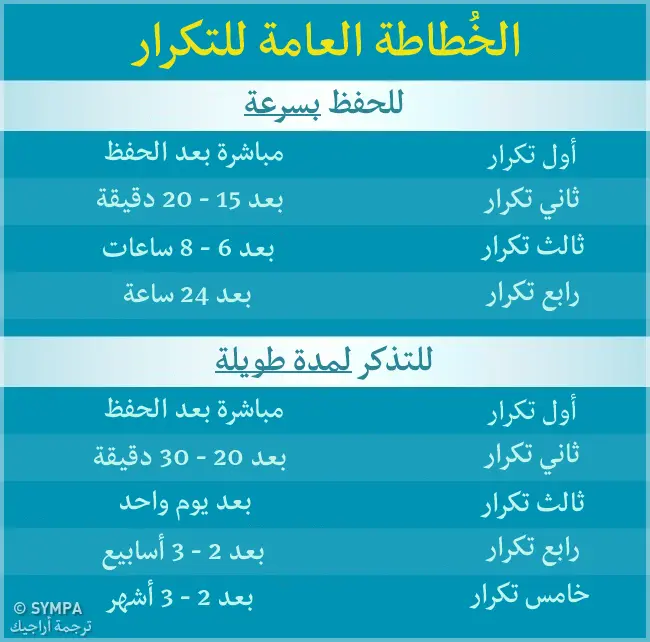Learn about the forgetting curve and how to keep information in memory for the longest time

Umm… I think I read about it, but I don’t remember where or the details…
The course of study for each of us must pass through the stage of memorization and recitation. One is obligated all the time to memorize many lessons and information and store them in memory. It can be said that the latter used in one way or another to use its basic energy in order to store quickly instead of storing it for a longer period.
This is inevitably what we notice after exams, and as soon as we finish them, information flies and we forget what we learned.
oblivion curve
The German psychologist Hermann Ebbinghaus , after a few studies and research, was able to accomplish a curve that embodies the changes of information in memory and forgetfulness that affects the latter, which he called “ the forgetting curve .” It is as follows:

Through our observation of this curve, and our quick reading of its data. It can be said that the human brain, after only one hour, forgets more than half of the information it receives! Even more than that... After one week, only 20% of his memory will be preserved!
An awful number. We need to stand up and think about it seriously.
In this connection the general scheme of repetition adopted by the same scholar may be recalled.
The general scheme of iteration
Briefly, this plan is:

This calligraphy says that there is a difference between exploiting repetition according to need and necessity. If you want to memorize quickly with the possibility of long-term forgetting, it is better to repeat it over a short period as well and in four stages within the twenty-four hour range after the initial memorization process.
But if a person wants to keep information for a longer time, whether learning the vocabulary of a foreign language, scientific information, historical events ... his memory must also get used to thinking and storing in the long term. For this purpose, what has been memorized must be repeated at intervals of up to two or three months.
From this and that, we can conclude that memory depends mainly on exercise and training, as the goal of memorization (whether at a speed or for a longer period) is the reference and the main determinant of the method of memorization (in the long or short term).
Tips to keep information for the longest time
For this, the intent is to keep the information in memory for a longer time. A range of tips and methods can be offered. We subtract from them the following:
# First you have to try to understand what you're memorizing , because scientifically it will make the information solidify in memory nine times faster. Therefore, do not make your memory a storage place for memorizing by heart, as if it were a machine for repetition, memorization and recitation only, but rather make good use of your memory capabilities in proportion to your intelligent, thinking human nature.
# There is the so-called sequential situation effect , which indicates in short, according to the conclusion reached by Hermann Ebbinghaus based on his experience on himself, that one's memory remembers better the first (the effect of precedence) and the last (the effect of modernity) of the elements of a chain or a list, so use them as a strength point during your save.
# There is a theory called the interference theory to explain forgetting , which proves that new events or information cause an imbalance in memory and thus interference in knowledge, which leads to forgetting previous information and replacing it with new (the type of retroactive interference) or the disruption of new learning due to previous acquisitions (the type of adequate interference) . For this, you should try to understand the materials in their general framework before moving on to the headings and sub-points, and also it is advisable not to review similar study materials at the same time or behind each other, as this will only increase the complexity of the learning process.
# Learn with opposites (especially for learning foreign languages), for example, if the word “jour” means day in French, you should know that the night is “nuit”. In the sense that learning with opposites is important to facilitate memorization and remembering.
# “The word - the nail” or the so-called “Mots-Clous” It is an old French method that is shortened to that, for example, if you want to learn a foreign language, link a word you learned with a word you previously learned. So, whenever you remember your usual word, it will automatically remember the other word. (It is easy to do if you use clips from songs, for example).
# If you have a strong auditory memory, it is best to use the audio recording method . Read the information or the word and record yourself. Listen to the recording over and over again, to find yourself memorizing and remembering it easily.
# Create your own style and style while saving. For example, a strange special tone for pronouncing the word, a graphic expressing information … You will find that it is a little fun and funny, and of course very useful and effective.
Finally, it should be noted, as we said earlier, that the process of memorizing and changing the pattern is only an exercise in memory. For this, you will notice the difference with repetition and maintenance. In addition to consistency in the primary objective of the educational process.
Also, tell us and share how you can remember information easier...
https://www.arageek.com/edu/how-to-keep-information-in-memory-for-longer-duration?fbclid=IwAR04dCxnFRrgLj5eP7LWUQ1g_6GP0v5wAYXX-MuRQgalcm2YhJHYZ44Oygo

